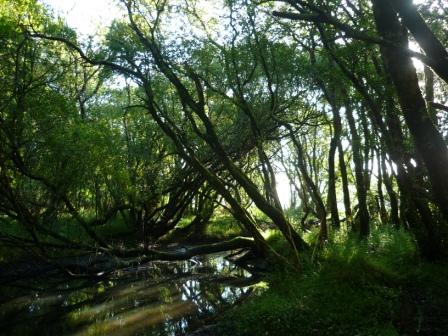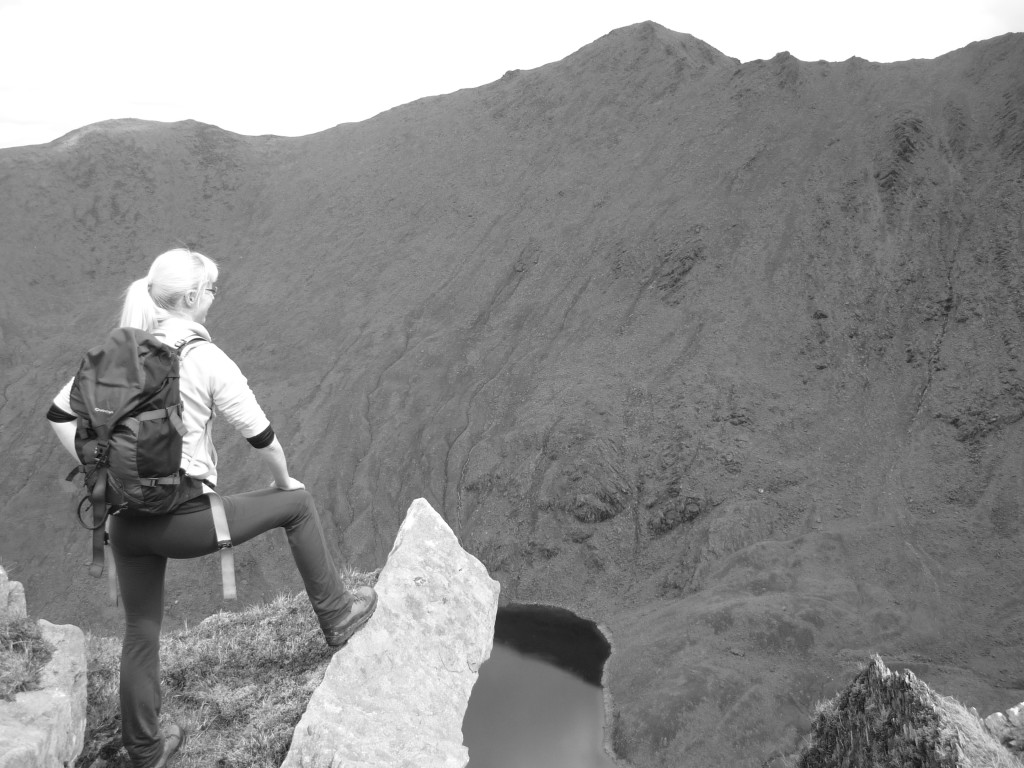By Sean Fagan
...
“Not all those who wander are lost”
JRR Tolkien
..
.
Vantage: a position giving a strategic advantage, commanding perspective, or comprehensive view.
Merriam-Webster Dictionary
.
.
SEEKING THE HIGH GROUND
.
Being able to navigate well is fun. It’s also a way of deepening a connection with the many interesting features of a landscape as well as the beauty of wild places.
Much of bushcraft is about connecting with wild, remote places, and good navigation skills can greatly aid that quest.
However, it’s so easy to become overly engrossed with the more technical aspects of navigation.
Between reading contour lines, following a compass bearing, recognising key landscape features and all the rest - its’ no wonder we can get distracted whilst missing out on some key, common-sense aspects of navigation.
There has been many times when I’ve paused while hiking to re-affirm my position and lo and behold, as I’m scrutinising my map there is, for example, a small hillock or old stone wall nearby that is missed as regards giving me a broader view of the landscape.
It can be amazing what a few feet of elevation can make in acquiring a grander, more detailed view of a landscape.
Good navigation is as much about short-range observation (such as spotting a nearby vantage point) as it is about long range observation – and these two ways of perceiving the landscape are very much complimentary.
At its core, good map and compass navigation usually requires a number of cues aligning together to reinforce where you are (your location), where you are going (destination) and how to get from your location to your destination (route).
Regularly availing of vantage points will enable you to get a better idea of your location, confirm your route is correct and finally, enable you to arrive, as soon as possible, to your destination.
After all, navigation is so much about good observation - and good vantage points facilitate good observation.
THE DIFFERENT DIMENSIONS OF NAVIGATION
A key aspiration of the map and compass navigator is to improve his or her ability to think three-dimensionally and two-dimensionally (often simultaneously).
The landscape is solid and undulating - it’s three-dimensional. A map is a flat, two-dimensional representation of a solid, undulating landscape. When you continuously use vantage points you improve your ability to recognise three-dimensional features of the landscape and recognise those features on your two-dimensional map.
Regularly availing of vantage points improves your ability to understand the relationship between your map and the landscape.
It’s a key navigational skill.
The more you can see of the landscape the better you will be able to navigate though the landscape…
By combining conspicuous landscape features (e.g. mountains & lakes) with micro details such as a specific bend in a river or the contour line details of a small, mountain ridge, you'll get a more accurate sense of where you are, and of course if you know where you are, you will have a much better idea about how to get to your destination.
Using vantage points enables you to observe as many large and micro features as possible, usually at the same time, which will greatly improve your ability to confidently and efficiently navigate to your destination.
HOW VANTAGE POINTS CAN BE IMPORTANT IN A SURVIVAL SCENARIO
Vantage points can be, depending on circumstances, a key navigation skill in survival emergencies.
What's crucial about vantage points is that once you make a habit of availing of vantage points when recreationally navigating you'll increase your chance of automatically remembering to use vantage points during dire circumstances like a survival situation in a wild, remote area.
When you think about it, there are countless survival scenarios that could be improved with the advantage of a good vantage point.
Acquiring a more comprehensive view of the landscape can give a survivor a clearer idea of where they are, where they need to go and just as important - what to avoid - such as difficult-to-traverse or dangerous terrain.
A lot of the time, when a person is thrust into a survival scenario, that person’s initial reserves of energy, physical strength and mental acuity can be vital factor in getting out of trouble, so it’s important, provided the survivor is physically and mentally sound, to strive in making good, well-judged decisions at the early stages of a survival situation.
Choosing the best route out of a survival situation towards possible salvation can be a vital decision in terms of survival.
Getting unnecessarily lost or selecting a poor route can be very costly in terms of depleting energy reserves, morale, injury potential etc.
The simple act of availing of a good vantage point can make the difference between survival or perishing.
Most people thrust into a survival situation don’t have a map and compass. If travelling to safety is the best survival option then it can be crucial to acquire a mental map of the surrounding area so as to decide what is the best route out of dodge.
Generic survival-navigation advice – such as “follow a river, downriver, to safety” in the vague hope of stumbling upon a riverside, human settlement, might not be the best route choice.
But availing of vantage points, when possible, is generally a sound idea. Why? They make the survivor observe and think about the surrounding landscape. Thinking about the surrounding landscape can be important in order to come up with a detailed-as-possible navigation plan to get out of a survival situation.
Also, internalising a mental map of the local area can prove useful if you need to backtrack to your original starting point, otherwise there is a risk of getting progressively more lost and confused.
Good observation skills is a crucial, often overlooked and taken-taken-for-granted aspect of bushcraft. Any practise that hones your observation skills is a valuable outdoor skill – and vantage points fall comfortably into this category.
.
.

Approaching nightfall. Do you have the skills and knowledge to confidently hike mountains in the dark? (photo: Sean Fagan)
.
..
CONCLUDING THOUGHTS…
Striving to obtain a broad range of navigational skills will greatly increase your outdoor awareness and will, without a doubt, enhance your enjoyment of the outdoors.
No matter how far you go with your navigation skills – vantage points will always be a reliable friend, so to speak, that you can rely on in a lot of situations when finding your way in the great outdoors.
In the immortal words of martial arts supremo, Bruce Lee:
“Absorb what is useful, discard what is useless”…
.
…and vantage points are pretty useful. . . .TOP TIP
.
Strive to seamlessly add natural navigation (such as solar & lunar noon and navigable stars, planets and constellations etc.) with your map and compass skills.
The constellations of Orion, Cassiopea, Ursa Major and the stars Sirius and Polaris along with the planets Venus, Jupiter and Saturn are all good night-time navigational aids.
The constellations Ursa Major and Cassiopeia are especially useful in locating Polaris (the North Star).
During the daytime - the sun (when visible) is a tremendous navigational aid (the time and compass bearing of the rising and setting sun along with the time of solar noon are 3 great navigational cues).
Becoming lost will be increasingly hard to achieve when you combine natural navigation with map and compass skills : )
.
An example of natural navigation. Even in an enclosed environment like a woodlands - there are visible signs of the nature of the surrounding landscape. The brightness emanating from right of photo indicated an open area (in this instance, a lake)(photo: Sean Fagan).
- Using the Stars of Orion for Navigation
- 4 Wilderness Safety Tips
- Bushcraft Safety: a Simple Way to Test for Hypothermia
- 7 Reasons why you should Camp in Winter
PIONEER BUSHCRAFT DISCLAIMER
.
The above article provides good outdoor advice when applied appropriately. It’s not the intention of Pioneer Bushcraft to encourage reckless behaviour and is therefore not responsible for the misapplication of the advice offered in this article.
Many bushcraft activities carry some element of risk - navigation included. It’s your responsibility to know all the risks associated with the bushcraft activities you choose to participate in.
Take your safety and well-being seriously. It’s a vital part of enjoying the great outdoors.
Great navigational skills are yours for the taking - provided you put in the time (think months and years, not weeks). Once acquired, you will derive a great sense of satisfaction - and the confidence to expertly navigate in challenging conditions.
And most importantly – enjoy yourself. Outdoor confidence & competence and enjoying yourself when outdoors go very much go hand-in-hand.


Recent Comments